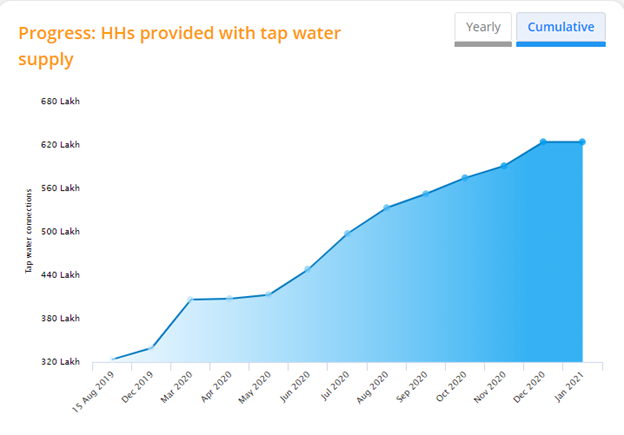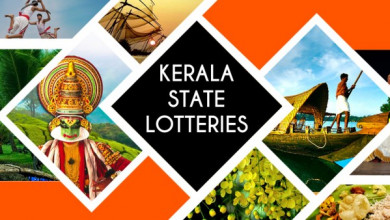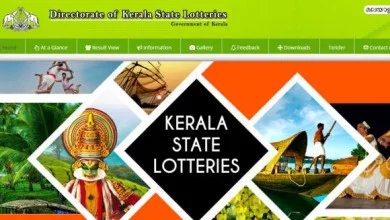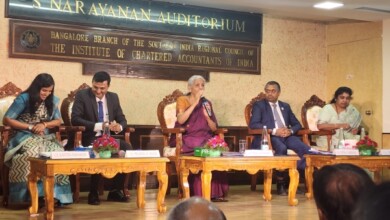In the last one year, more than 3 Crore tap water connections provided under Jal Jeevan Mission
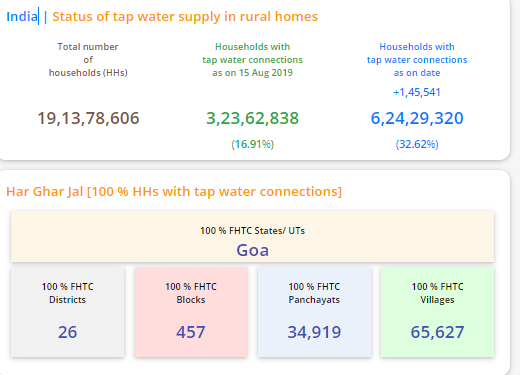
On 15th August, 2019, Jal Jeevan Mission was announced by the Hon’ble Prime Ministerfrom the ramparts of the Red Fort with an aim to provide Functional Household Tap Connection (FHTC)to every rural household by 2024. Jal Jeevan Mission is under implementation since August, 2019 in partnership with the State governments with an aim to provide potable water in adequate quantity and of prescribed quality on regular and long-term basis. As on 15th August 2019, out of 18.93 Crore rural households, 3.23 Crore (17%) had tap water connections.
During this year, every State/ UT did extensive planning following ‘bottom-up approach’ and have firmed up their plan to provide tap water connection to every home. The untiring efforts of States/ UTs have helped Jal Jeevan Mission provide 3 Crore tap water connections since August, 2019. Further, 26 districts, 457 Blocks, 34,919 Panchayats and 65,627 villages have become ‘Har Ghar Jal’ meaning every family living in these rural areas is getting assured tap water supply in their homes and ‘no one is left behind’. Goa has become the first State in the country to provide 100% FHTCs and became ‘Har Ghar Jal’ State. Different States are competing with each other and focusing on the set target to ensure that every household in the country gets safe drinking wateradhering to the core principle of ‘equity & inclusiveness’.
States are giving priority to water quality-affected areas, Scheduled Caste/ Scheduled Tribe majority villages, aspirational districts, village in drought prone and desert areas and quality-affected habitations. States are working to ensure that piped water supply reaches the regions affected by Fluoride and Arsenic at the earliest as well.
The Jal Jeevan Mission journeyso far has been filled with challenges and disruptions as the entire world battled with CoVid-19 pandemic fromMarch,2020 till date. All the workshave been badly affected due to lockdown and construction work was badly affected in most parts of the country. Handwashing has become the most important tool meaning availability of adequate safe & clean water inside home has become all the more important. Giving primacy to this and with the spirit of changing lives, States/ UTs continued the water supply work following due precautions emphasized by the Government. Continuing work despite CoVid-19 also proved to be a boon for local economy generating livelihoods in their own villages, especially for the migrant labour who returned home.
As the Union government has been working towards making lives better for women across various sections by constructing individual household and community toilets, providing cooking gas, etc. similarly, tap water connections within the household aims to reduce drudgery and enhance ‘ease of living’ for young girls and women who are often burdened with the task of fetching water from the public standpost and walking long distances in search of water. By providing water at the doorstep, Jal Jeevan Mission is impacting the lives in multiple ways by improving the health parameters and reducing dropout from school among children.
Progress of tap water supply in rural households since the launch of Mission
As on 15.08.2019 As on 01.01.2021
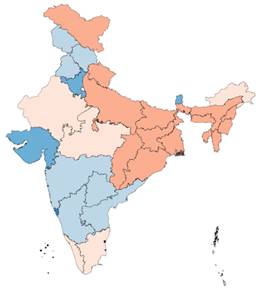
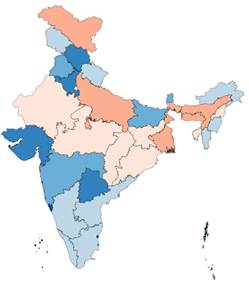

Household tap water connections – data as on 01.01.2021

Ensuring disease free life and holistic development of our children is a priority. In this spirit, a ‘100-Day Campaign’ was launched on 2nd October, 2020 to provide piped water supply to every school, anganwadicentre (AWC) and ashramshala, i.e. residential schools for children from tribal communities. Under this campaign, potable tap water will not only be available for drinking and cooking mid-day meals, but also for hand washing and running tap water in toilets.So far, in 3 months, more than 4.4 lakh rural schools and about 3.73 lakh AWCs have started getting potable tap water. Punjab and Tamil Nadu have become the first States to provide every school with tap water supply. Also, every AWC in Tamil Nadu is provided with tap water.
Consumption of contaminated water has adverse impact on our health, especially children. In this backdrop, upgradation of water quality testing laboratories and its accreditation from NABL have been taken up. There are about 2,300 water quality testing laboratories with States/ UTs and these have been opened up to general public, so that they can get their water samples tested at a nominal cost. Also, emphasis is given to empowering local village community to keep surveillance on quality of water supply and/ or source through regular testing using Field Test Kits (FTKs). A grand challenge is going on in partnership with the DPIIT to develop ‘portable domestic water quality testing devices’.
Under Jal Jeevan Mission, Village Action Plans (VAPs) for five years, co-terminus with the 15th Finance Commission are prepared so that fund available to PRIs can be gainfully utilized by GPs for assured water supply delivery to homes. These VAPs are aggregated at district level to formulate the District Action Plans (DAPs), which are consolidated at State level to formulate the State Action Plan (SAP). SAPcovers projects like regional water supply schemes, bulk water supply and distribution projects, etc. to ensure drinking water security in the State.
The mission requires skilled human resources in areas like masonry, plumbing, fitting, electricals, pump mechanics, etc., in every village/ habitation, whose services will be used for creation of water supply schemes as well as regular O&M. Such a pool of skilled human resources in rural areas will make villages a self-reliant unit for regular upkeep and maintenance of water supply systems in line with idea ‘AtmaNirbhar Bharat’. This programme is to provide employment opportunities and boost local economy.
National Jal Jeevan Mission is assisting States/ UTs, which also include teams visiting villages to review the implementation and provide technical assistance to expedite the implementation with focus on prudent investment. The teams interact with members of GPs/ VWSCs and local community as well as PHED officials with focus on community participation and institutional arrangements for expeditious implementation. It is observed that local village communities, NGOs, SHGs, sector partners have joined hands to make Jal Jeevan Mission truly a ‘people’s programme’. The Mission is working on bringing about social and behavior change to ensure drinking water security.
